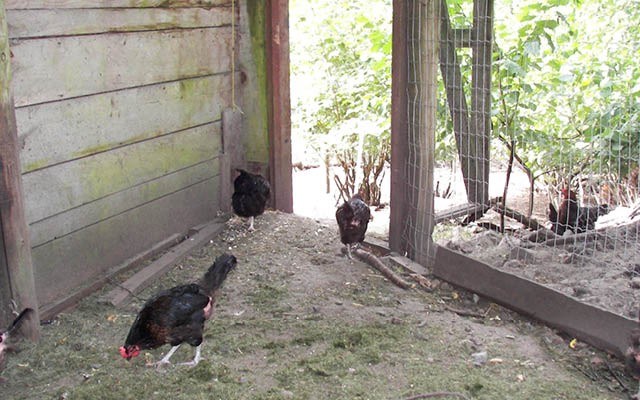Whether or not Squamish residents should be allowed to keep backyard chickens was the hot topic at this week's council meeting.
The debate was part of a larger look at an omnibus bylaw, which had been drawn up by staff to update and amend current zoning bylaws to keep them relevant.
"There are many benefits to having backyard hens," said Caroline Morris, the first to speak during the public hearing on the bylaw.
"We're not a bunch of rebels that are just trying to stir the pot that are coming forward with this.
"We are passionate citizens who are looking to connect with our food. We're looking to sustain ourselves and provide healthy options for our consumption."
As the manager of the farmers' market in Squamish she said she sees first hand that Squamish has very few farms, and food security in the community is an issue. She has been lobbying for changes to allow for backyard chickens in residential areas for more than two years.
Morris said wildlife concerns are legitimate, but she added that if chickens are kept in well-built coops, and if food is properly stored wildlife issues could be effectively managed.
Of the 13 people who spoke at the public hearing, most said they supported allowing residents the option of raising backyard chickens.
Dave Colwell doesn't share Morris' enthusiasm for backyard chickens.
"I am in support of a chicken co-op, properly organized and operated in a location which is central, but away from, residences," said Colwell.
"I'm not in favour of any farm-type livestock in the backyards of urban residences."
Colwell predicted chicken owners wouldn't build coops strong enough to keep out bears, cougars, raccoons and rats.
"Currently, chickens are allowed on land where agriculture is a permitted use, so this includes rural residential one and two and resources lands," explained Squamish planner Elaine Naisby. "If this amendment is passed chickens will be allowed on all lands in the district."
Naisby also noted there are no poultry and fowl regulations in place, adding that licensing, fees, abandonment issues and enforcement issues will have to be addressed in the future if the bylaw amendment passes.
Before mayor Rob Kirkham opened the public hearing, Councillor Doug Race wanted to know if, under the proposed bylaw amendment, there would be a limit to the number of chickens a homeowner could have.
"Without any regulations, they would be able to have an unlimited number and type of fowl," said Naisby.
She followed her answer by pointing out that regulations can be created in the future to address details like how many birds can be kept in a residential backyard.
Chicken husbandry isn't the only item in the omnibus bylaw.
The technical amendments in the proposed bylaw call for changes that would allow the production of alcoholic beverage manufacturing in Squamish, regulate driveway lengths, provide a definition for a pet daycare facility and establish regulations for shipping container uses.
Naisby told Squamish council members on Tuesday, May 6, that the omnibus bylaw contains 80 unrelated changes to address topical issues, amendments to specific zones and technical clarifications.
After the speakers shared their thoughts Councillor Ron Sander called the bylaw amendment a flawed document due to a number of phrases he said were poorly worded.
District staff indicated the phrasing could be cleaned up before the bylaw amendment comes before council for third reading at a future meeting, possibly as soon as May 20.
Kirkham said council members would debate the bylaw at third reading.




